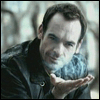More often than not when you ask me who my favorite character in a book, film, or television series is, it’s the hero. Not that I don’t appreciate the grayer characters, the morally ambiguous types–tricksters, shady allies and informants, double-agents, self-serving baddies with sympathetic pasts and motivations. But I think sometimes those grayer characters get overvalued, proclaimed “way more interesting” than the heroes, who are decried as boring and predictable when the do the right thing, and lambasted when they make a mistake. Similarly, fans who like hero characters are made to feel like throwbacks to 1952.
But where would we be without the heroes? A story full of characters whose primary motivations are self-serving or up for grabs may make an interesting read/viewing experience, but an abundance of stories like that leave me feeling ungrounded. Morally gray characters are like icing without the cake. I need to have someone in the story who I can root for without feeling like I washed myself with a dirty rag. Someone far from perfect, but who shows genuine courage, and who I know is trying to do the right thing, even if they mess it up a lot along the way. Even if, in the end, they fail.
An engaging hero character requires work on the part of the writer. Many heroic characters face odds so steep that their success, or the traits they possess that allow their success, make them larger than life and difficult to relate to. Giving them flaws that humanize them, though, is tricky. If a hero character is flawed in ways that make him or her unlikable, a reader/viewer can feel manipulated by the narrative–as if they’re “supposed” to like them, even if they don’t.
One thing to remember, though, is that there is a difference between the viewer/reader rooting for the hero even though s/he’s a better man than you, gunga din, and being able to “relate to” him or her. I often don’t relate to the heroes that I find myself rooting for. I can’t imagine being them. But I root for them nevertheless, because the writer has made them sympathetic, human, and likeable.
It’s a bit embarrassing, though, to be asked who your favorite character is and have to “admit”:
Oh, Highlander? Duncan Macleod
Harry Potter series: Harry Potter
Merlin BBC: well, Merlin, of course
Angel the Series: Angel
Star Trek Deep Space Nine: Ben Sisko
Once Upon A Time: Emma Swan
Harry Dresden: Harry Dresden
…and so on.
It’s not always the case though. My favorite ST: TNG character was Data. But of course, he was the epitome of the awkwardly sincere trying-to-be-the-best-of-humanity. And my favorite character on Lost was Hurley, but y’know, Everyman with a Heart of Gold, he was. On ST: Voyager, I liked Be’lanna Torres. I have a thing for the fucked-up tough girls. But I’m not sure I would have stayed glommed onto the angry, screwed-up babes if they weren’t flawed-but-trying-to-be-a-good-person. To wit: Faith on BtVS/AtS. Although she was never my favorite character on Buffy the Vampire Slayer. I never really had one, except possibly the foursome of Buffy+Giles+Willow+Xander. The collective heroic.
Do I get points if my favorite Anne Rice vampire was Armand? He was no saint. I could never stand Lestat, but I liked Louis quite a bit. I prefer my vampires with a soul.

